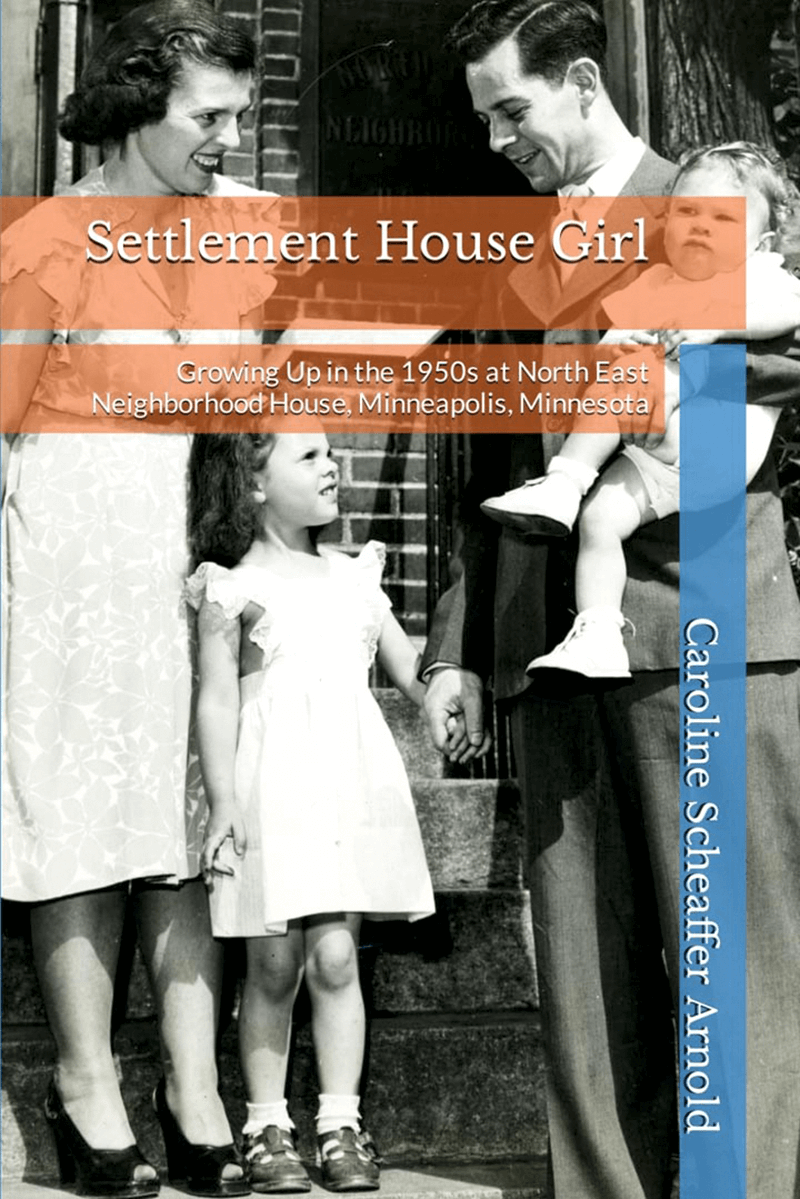
“Settlement House Girl” is a look back at Northeast Minneapolis in the 1950s. It’s also a lingering look back at the Northeast Neighborhood House (NENH) before it merged with the Margaret Barry House and became East Side Neighborhood Services, told not by someone who received its services, but by the daughter of the man who ran the social services agency.
Caroline Scheaffer Arnold lived at NENH for six years, 1948-1954. Her father, Les, and mother, Kay, both social workers, moved to Minneapolis from Syracuse, N.Y., after Les was offered the job of settlement house director.
Settlement houses, Arnold explains, “developed out of the social reform movements of the late 18th and 19th centuries. Most were in large cities such as New York, Chicago and San Francisco, in neighborhoods crowded with recent immigrants, many of them poor.” Northeast Minneapolis, with its ever-changing immigrant population, had Margaret Barry House and NENH.
Immigrants learned English, job skills and took citizenship classes, received dental and medical care and child care services through settlement houses. When the Scheaffer family moved in, the immigrants who came to NENH were primarily Northern Europeans.
It was common for house directors and their families to live in the settlement houses, along with university students who served as part-time staff, although that practice came to an end in the 1950s. The Scheaffers were the last family to live in the brick building at 1929 2nd St. NE. (It was converted to low-income housing after the merger.)
Kay Scheaffer performed the role of unofficial (unpaid) first lady, hosting teas, supervising resident housekeeping and consulting on the NENH nursery school while being a field instructor for the University of Minnesota Social Work School.
In the book, Arnold talks about living in the apartment (her mother hung the family’s laundry on clotheslines strung across the building’s roof), walking to Holland School and playing in Bottineau Park. She also mentions attending NENH’s nursery school and participating in arts and crafts projects at the settlement house after school.
Asked about being teased about living in the settlement house, Arnold said in an email, “Most neighborhood kids were a little bit in awe — thinking mistakenly that our family must be rich. We weren’t. What set me apart from the neighborhood kids was that I didn’t go to Holy Cross School and I wasn’t Catholic.”
In today’s world of helicopter parents and supervised playdates, the freedom young Caroline had to hop on her bike and go to the library on Central Avenue or play all day until the street lights were lit seems almost shocking. But that’s the way it was.
Arnold also writes about the development of Camp Bovey, which NENH bought for $6,000 in 1949. Originally named Camp Hodag, it was one of Les Scheaffer’s goals to establish a camping program for Northeast kids. Scheaffer and his family spent many weekends at the camp, getting it ready for the camping season or just enjoying it on their own. Later, his children attended as campers. Arnold writes, “It is my great luck to have spent so much of my childhood there.” She later became a camp counselor.
NENH and the Margaret Barry House merged in 1963. By 1965, Scheaffer reported to the ESNS directors: “Out of our experiences of the last year, we got a real sense of being needed, not only by our individual neighbors, but by the larger community.”
Arnold said she wrote the book because “My childhood was unique. Few children grew up in a settlement house as I did, and I wanted to leave a record of my experiences at North East Neighborhood House for the historical record.” She worked on it for 10 years.
“Settlement House Girl” is an easy read. Arnold has authored books for children, and she writes in a clear, straightforward manner. If you’re a collector of Northeast history books, it’s a good one to put on your bookshelf.
A book signing of “Settlement House Girl” with author Caroline Scheaffer Arnold will be held 6:30-8 p.m. Thursday, April 18 at East Side Neighborhood Services, 1700 2nd Ave. NE. It will be held in conjunction with a celebration of Camp Bovey’s 75th anniversary. Copies of the book will be available for sale; proceeds will benefit Camp Bovey.